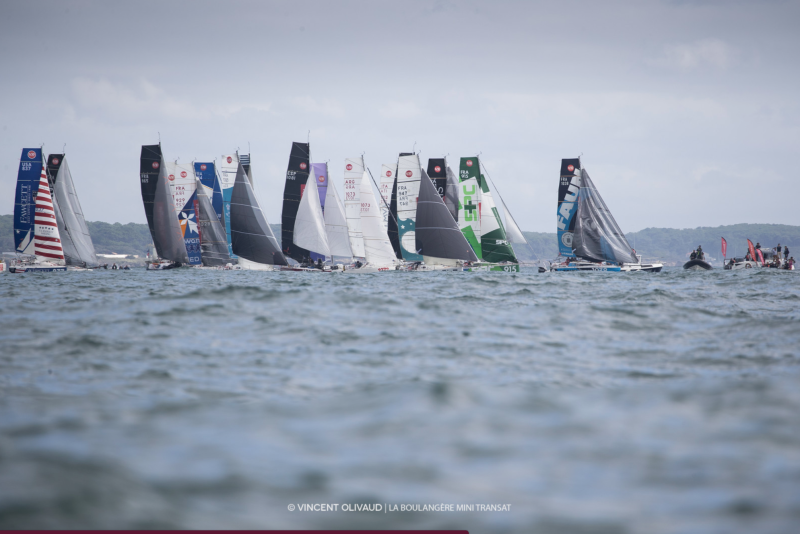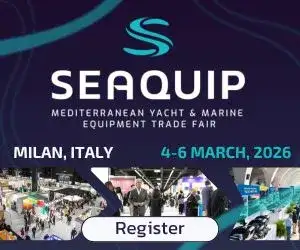
La Boulangère Mini Transat
La Boulangère Mini Transat: heading to the Canary Islands
After being postponed for 24 hours due to adverse weather conditions forecasted off Cape Finisterre on Wednesday, the first leg of La Boulangère Mini Transat set sail on Monday, September 25th, at 13:38. Powered by a gentle southeast breeze blowing between 4 and 7 knots, the 90 competing sailors departed from Les Sables d'Olonne, bound for Santa Cruz de La Palma, covering a total distance of 1,350 nautical miles, with nearly as many challenges to overcome. The real action was expected to begin overnight with a period of light winds followed by an initial transition phase. This may begin to shape the fleet's hierarchy, which is likely to remain relatively close-knit until they reach Cape Ortegal, where the first major strategic maneuvers could truly commence.
"We all marked this departure on our calendars two years ago. This time, we're here! We're getting into the thick of it, and it's quite something. I'm not exactly sure what it is. The world, the noise, the encouragement... emotions are running high. It's concretely the beginning of a great and beautiful human adventure. We've all prepared extensively for the race, but we hadn't necessarily anticipated the overwhelming emotional impact of the start! What's certain is that we're all very eager to go!" explained Jérôme Merker (857 – Ensemble contre le cancer de l'enfant), just before leaving the Sablais pontoons on Monday morning. This sentiment was shared by Bruno Lemunier (893 – Kalisto & Aerofab): "A departure day like this is a whirlwind of emotions. It's true that we've been working towards the goal of crossing the Atlantic solo for two years. It's an incredible opportunity to be here, and it's even truer given that we're departing in quite pleasant conditions." Pleasant, indeed, as the first 48 hours of the race are expected to unfold in relatively gentle conditions, though not necessarily easy.
A tactical start
In fact, solo sailors had to contend with light winds and even a calm patch during the first night, followed by a shift to westerly winds. Finding the right settings, perfecting their navigation, and staying alert to gusts and shifts will be on their agenda. This will be a welcome challenge for the "pointed bows," as they'll have the chance to compete with the newest scow-type boats, including those equipped with foils, which may, however, take advantage of some very favorable phases. Jacques Delcroix (753 – Actual) confirmed this: "It's better for us to start in light winds than reaching in 20 knots, but light winds are always tough. We'll need to play the small wind variations to create gaps," noted the skipper, a sentiment echoed by Hubert Maréchal (787 – Osons Ici et Maintenant). "In light winds, it's never easy to make the boat move, regardless of the type of bow. We'll have to fight because there are fewer sensations and less adrenaline. The challenge will be to try to be smarter than the others or at least faster," said the Parisian navigator, accustomed to close-contact racing and content with the program for this part of the race, which is expected to be tactical. As mentioned earlier, this phase will include a transition at the end of the upcoming night, followed by another one even before reaching the waypoint added by the Race Management north of Gijón, to avoid rough weather in the Bay of Biscay.

Quick Recovery from Emotions
"There will be things we'll miss and things we'll succeed at. It'll be important to try to understand what's happening and adapt if we haven't done exactly what we intended to do. There will be small opportunities to seize. It'll be interesting and fun. One thing is for sure: we'll need to quickly digest the emotions of the start and immediately get into the race," said Gaby Bucau (865 – Maximum), who anticipates not getting much sleep until reaching the virtual mark on the night of Tuesday to Wednesday. However, he also knows that they'll need to maintain the pace in the race, especially considering that according to the latest routings, this first leg could be a bit lengthy, lasting around nine days for the fastest boats and up to twelve for the stragglers.
They Said
Willy Muller (1029 – Tars): "I'm really looking forward to it. We're starting in very light conditions. It's great for the pointed bows. Today's our day; today is the day to shine! (Laughs) We'll have a somewhat complicated night with transition phases to negotiate. It's going to be intense, but we'll need to get some sleep to be in good shape when the wind comes in. We'll need to tread a fine line. At Cape Finisterre, there will be more wind, but it should go really well compared to if we had left on Sunday as originally planned. It's very reassuring. I'm primarily here to have fun and to reach the Canary Islands. The goal is to finish this first leg. I'll allow myself to be more aggressive in the second leg. Nevertheless, if I manage to stay ahead with the pointed bows, I'll be really happy. There are eleven of us, and at least six want to be first. What I expect is a good competition rather than a high final ranking."
Félix Oberlé (1028 – Mingulay): "It's D-Day, and there are a lot of emotions. We don't really know what to expect. We know there will be lots of unforeseen events. We're trying to prepare for them, but it's not that simple. We'll see how it goes as time goes on. The beginning is, I think, quite clear for everyone. Then there will be decisions to make as we approach Cape Finisterre. I'm obviously here to compete in the race, but my primary goal is to finish. That's the foundation, so if I achieve that, it's already cool. Of course, if I can also engage with others and be in the competition, that would be great, but for now, I prefer not to put too much pressure on myself. I remain focused and try to stay calm, at least on the outside, because inside, I admit, it's boiling!"
Hugo Cardon (889 – Hugo Sarth'Atlantique): "We won't be shaken up at the start, but the strategy is still complex. We know that anything can happen in the calm where gaps can appear and disappear quickly. The first few hours will be crucial, but we shouldn't get too worked up if we're not at the front. The race will be long. What will be important is to play a bit of fleet control but also to be fast, which is always easier said than done. What's great is that this first leg looks to be very complete. There will really be options to explore with people willing to take some risks and potentially create surprises. That's what will make the race beautiful. It's going to be cool!"
Arthur Petrucci (973 – Duvergt-FBI, Les P'tits Doudous du Scorff – Lorient): "I feel good. There's nothing left to do but go. The weather files are quite variable. There's a lot of instability. We'll need to focus on the weather information that will be provided in the early days. Usually, we can rely on fairly reliable weather forecasts, about four days in advance or so. But on the water, we'll have to use HF radio for weather info and weigh routing options differently from what we would have done on land. Until Cape Finisterre, there will be somewhat mandatory tacks. There won't be any major strategic options to play. Speed will be paramount until reaching the waypoint. The boat is ready, and so am I!"
Jean-Baptiste de Sansonetti (335 – Atlantique Solutions): "I'm really excited; I think it's incredible! Crossing the Atlantic is going to be amazing. It's the first time I'm crossing the Atlantic. It's also the first time I'm going to the Canary Islands and Guadeloupe. It's going to be great! I thought we would leave on Sunday, but I completely understand the Race Management's decision. At the beginning, we'll be sailing along the coast, which means we won't get much sleep because there will likely be a lot of fishermen. I like fishermen, but not when I'm sailing! We'll have to be very careful, but that's part of the game. There will be no wind, and there's nothing we can do about it. We signed up for the Mini Transat to cross the Atlantic, so we don't have a choice!





